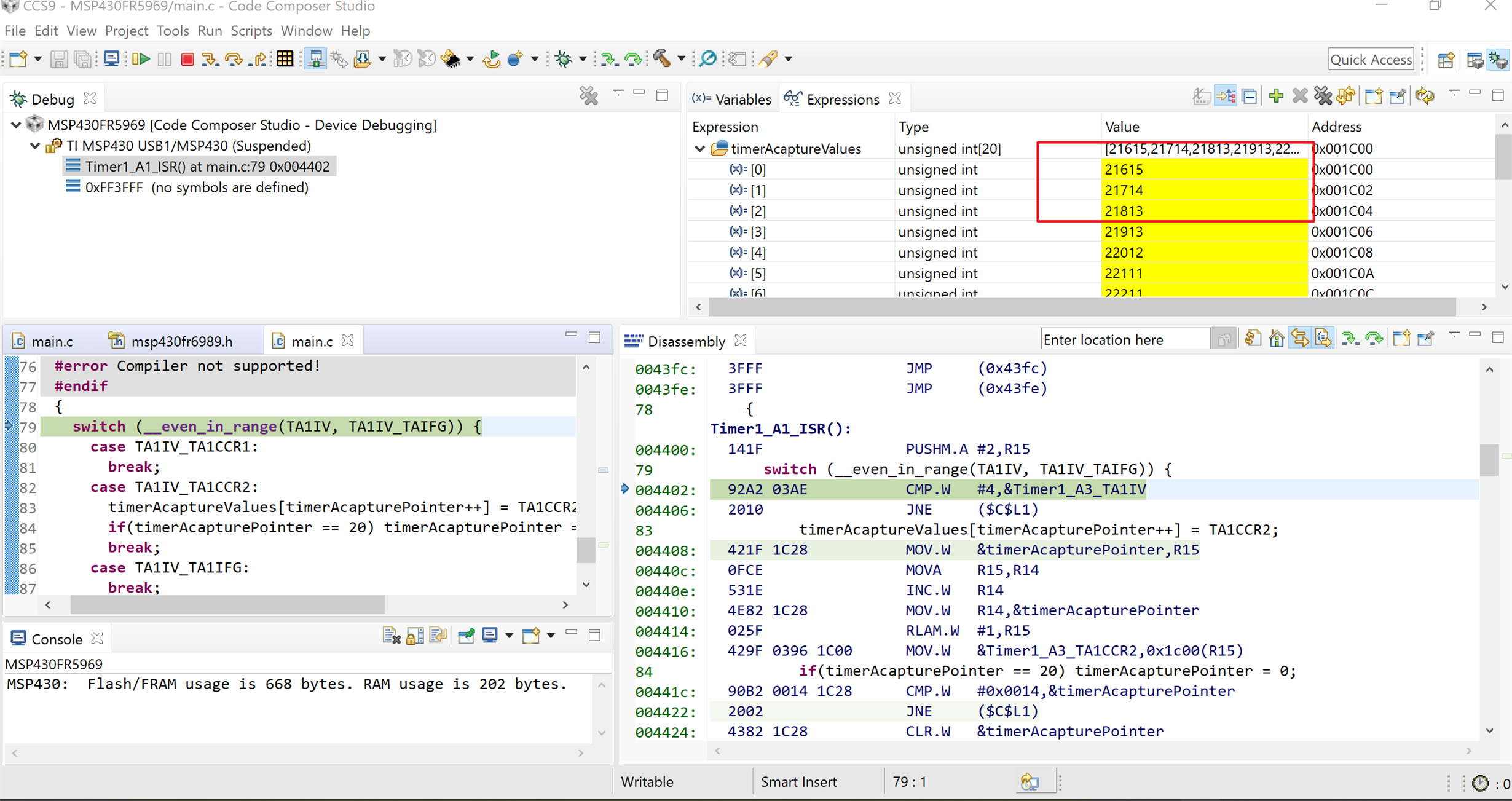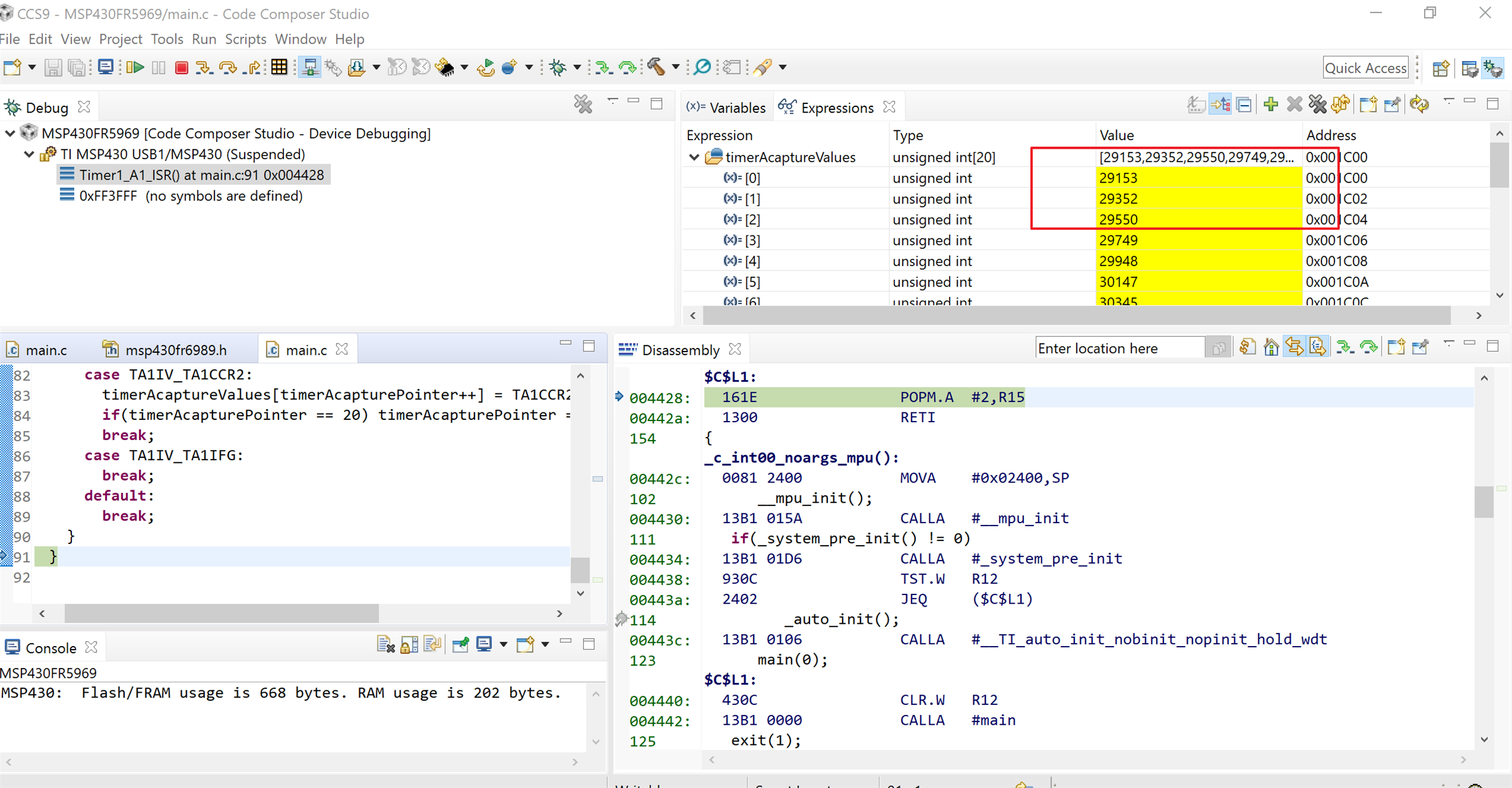Tool/software: Code Composer Studio
Hello,
Days before I posted a doubt about trying to capture an external square wave signal using as an example "ta0_capture.c". but conecting in P1.3 an external signal instead of using the internal one. I achieved to capture the signal, but the increase of values of the timer (vector 'timerAcaptureValues') does not change if I increase the frecuency, neither the frequency of the external signal nor the frequency of the timer. What should I change or implement on the code, if I want that the Timer increment value changes if I modify the frequency of the external wave signal or the frequency of the timer?
Thank you,
**HERE IS THE CODE**
#include <msp430.h>
#define NUMBER_TIMER_CAPTURES 20
volatile unsigned int timerAcaptureValues[NUMBER_TIMER_CAPTURES];
unsigned int timerAcapturePointer = 0;
int main(void)
{
WDTCTL = WDTPW | WDTHOLD; // Stop watchdog timer
// Configure GPIO
P1OUT &= ~0x01; // Clear P1.0 output
P1DIR |= 0x01;
P1SEL1 &= ~BIT3; // Set P1.3 to input direction
P1SEL0 |= BIT3;
P1DIR &= ~BIT3;
// Disable the GPIO power-on default high-impedance mode to activate
// previously configured port settings
PM5CTL0 &= ~LOCKLPM5;
// Clock System Setup
CSCTL0_H = CSKEY >> 8; // Unlock CS registers
CSCTL1 = DCOFSEL_0; // Set DCO to 1MHz
CSCTL2 = SELS__DCOCLK; // set SMCLK = DCO
CSCTL3 = DIVS__1; // Set dividers
CSCTL0_H = 0x00; // Lock CS module (use byte mode to upper byte)
__delay_cycles(1000); // Allow clock system to settle
// Timer0_A3 Setup
TA1CCTL2 = CM_1 | CCIS_0 | SCS | CAP | CCIE;
// Capture rising edge,
// Use CCI2A=P1.3,
// Synchronous capture,
// Enable capture mode,
// Enable capture interrupt
TA1CTL = TASSEL__SMCLK | MC__CONTINUOUS; // Use SMCLK as clock source,
// Start timer in continuous mode
__bis_SR_register(LPM0_bits | GIE);
__no_operation();
}
// Timer1_A3 CC1-4, TA Interrupt Handler
#if defined(__TI_COMPILER_VERSION__) || defined(__IAR_SYSTEMS_ICC__)
#pragma vector = TIMER1_A1_VECTOR
__interrupt void Timer1_A1_ISR(void)
#elif defined(__GNUC__)
void __attribute__ ((interrupt(TIMER1_A1_VECTOR))) Timer1_A1_ISR (void)
#else
#error Compiler not supported!
#endif
{
switch (__even_in_range(TA1IV, TA1IV_TAIFG)) {
case TA1IV_TA1CCR1:
break;
case TA1IV_TA1CCR2:
timerAcaptureValues[timerAcapturePointer++] = TA1CCR2;
if (timerAcapturePointer >= 20) {
while (1) {
P1OUT ^= 0x01; // Toggle P1.0 (LED)
__delay_cycles(100000);
}
}
break;
case TA1IV_TA1IFG:
break;
default:
break;
}
}




